How can the label industry attract Gen Z?
A panel at Finat’s European Label Forum addressed a perennial issue facing the label industry – how to attract young talent.
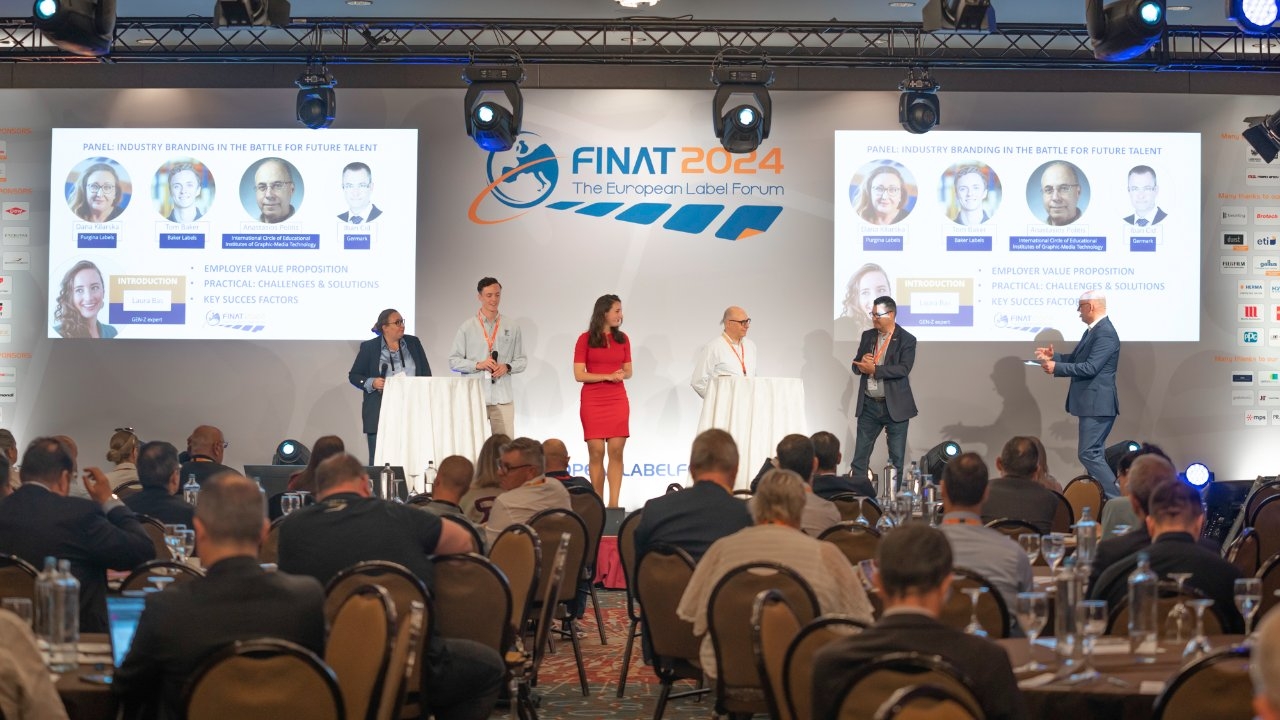
How should the label industry brand itself in today’s battle for young talent? What is Gen Z looking for from their careers? And how can companies retain and develop young employees? These questions were tackled at Finat’s European Label Forum 2024 in a panel discussion featuring Gen Z expert and former United Nations Youth Ambassador Laura Bas, Anastasios Politis from IC (International Circle of Educational Institutes of Graphic Media Technology and Management), and three family-run label converters: Iban Cid of Germark, Spain; Dana Kilarska of Purgina Labels in Slovakia, and Tom Baker of UK-based Baker Labels. Below are edited highlights of the panel, moderated by Finat’s Bert van Loon.
Laura Bas, Gen Z expert and former United Nations Youth Ambassador
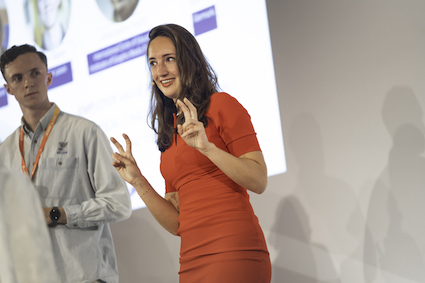
The younger generation lives a digital life. If they are interested in a certain company, they will look at the website but also on social media to make sure you have some sort of online presence there. It doesn’t have to be super professional. One Gen Z trend is uploading a ‘day in the life’ video when you have a vacancy. You ask someone to film what their work life looks like for 60 seconds. It doesn’t have to be professional: Gen Z loves authenticity. People can get an impression of what a day in the life of someone who works in the company looks like. Young people look for places where they can learn a lot. Studies show they find being able to learn more important than earning a lot of money. When the Millennials entered the workforce, we had the banking crisis. So, they had a different starting point and had to work hard to get a job. They weren’t able to have high standards. Gen Z has more options and is in a position where they can choose. Gen Z isn’t attracted by status. They want to work at a place where they can make an impact. I’ve heard you say that print is not a sexy industry, but I think the label industry has a lot of benefits.
“Gen Z isn’t attracted by status. They want to work at a place they can make an impact”
Talking to many of you over the past two days, I heard someone say: “What I really like about this industry is that everywhere you go, you see products you are making.” This is an excellent asset to tell people: everywhere you go, you see stuff we make. There are also a lot of people who hate working in an office, who just want to work with their hands and be busy. Manufacturing is the perfect place for that.
Anastasios Politis, chair, International Circle
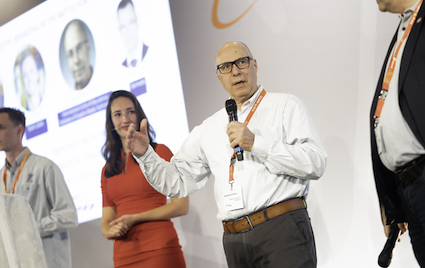
I love print. I love the machines and the inks. The smell. Everything. But how should we transfer this love that we have for this sector into something that young people can understand? In my opinion, formal education and training is not enough anymore. This is my experience from Greece and in Europe, because we all want to recruit people, and we find no one. Only yesterday, I had six requests for people to be employed in the print industry. We have no one because, for our official educational system, print media and packaging education doesn’t exist. So, we have to as industries, as companies, and maybe as organizations like Finat, find new ways to recruit our people. There have been efforts in recent decades in Europe to present the sector in a sexy way and attract young people. But we need to think differently. We see that countries where we have contacts through the International Circle, in India and Australia, and especially in the US, they promote print quite aggressively. They say: I’m in print and I’m proud. Young people don’t know about the industry, so we need to help.
“When people know the industry, they love it. The label sticks people to it”
We had a booth at drupa and we met with a lot of young people there to introduce them to our sector. The theme of our booth was: Reinvent print education. We will hand out Labelicious leaflets because we have partnered with Finat to promote that competition. International Circle was the main exhibitor, and there were 12 other organizations alongside us including the Print Media and Engineers Association from Greece and universities from Turkey, Germany, France, Canada and the US. We introduced them to every effort that the industry undertakes to help attract young people to the sector. We want to try to establish a strategy not only for education but also for developing people in the sector, no matter their position, so that we can develop our human capital. This is something that is easy to say and difficult to do, but at least we will try.
Iban Cid, managing director, Germark
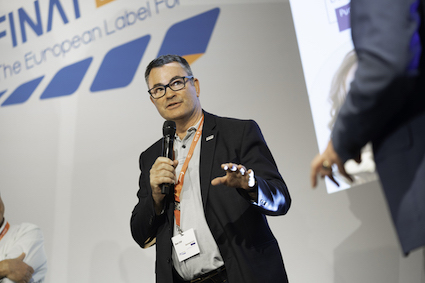
Attracting young talent into the label industry is very tough. Many of our staff come from the Antoni Alguero Graphic Arts School in Barcelona, which is run by the Catalonia Graphic Arts Association, of which I used to be president and am now vice president. But even with these students, it isn’t easy. They all want to work on a desk with a Mac. Great, but what can you do with the Mac? In real life, the economy is moving with industry, machines, shop floors – yes, with Macs as well. But you need some skills too. Print, as an industry, is not sexy. Why not? No one wants to get their hands dirty with ink. But packaging is sexy. You sell your brand, your company. You can take photos of the packaging for Instagram. This is the stuff which attracts people, not the shop floor. If we show potential recruits around the company, we show them the digital presses. If you want to attract people, it is better to show them nice, clean things. Staff retention is a challenge. We suffer at Germark because the big converter groups take our staff. It’s one thing to advertise on LinkedIn, but going directly to other companies’ staff is not a fair way to recruit people. In my father’s time, the converters met and agreed not to do this. But nowadays, this is happening again with the big printing groups. Competing with the big groups is hard because they have a lot of resources. But the advantage we have as a smaller company is that we take care of our people. At bigger companies, you are just a number. We have had cases where an employee has left for a larger firm, seeing the difference in how they are treated and returned to us. When people know the industry, they love it. The label sticks people to it. However, the first challenge is to get them to see the industry. I don’t know how we can overcome this issue.
Finat keynotes address global markets, sustainability
By Chelsea McDougall
Former prime minister of Belgium Guy Verhofstadt had a stark message for attendees of the European Label Forum, hosted by Finat. ‘The world of today and the next decade will be a brutal competition in every field between the world’s biggest nations – economically, militarily, technologically,’ he warned, adding the risk of violence, isolationism and deglobalization places all global economies at risk. The annual meeting of the European self-adhesive label association hosted 280 visitors from 24 countries in Athens in May. During his address, Verhofstadt advocated for a stronger and more integrated European Union. ‘The risk in this new world is of violence – a military risk. A world in which war has returned,’ he says. ‘After decades of globalization of the world economy, now there is a risk of deglobalization, an unraveling of economic ties. Countries want control over their own supply chains,’ Speaking on the label supply chain, AWA Alexander Watson Associates analyst Anum Javed Beg presented the findings from Finat’s latest Radar Report along with Finat managing director Jules Lejune. ‘Last year was the worst nightmare for label stock demand since we started recording the numbers in the early 2000s,’ Lejeune says. ‘The impact of destocking was more than 2 billion sqm of lost label production.’ This represented a 25.8 percent decline from the previous year, down to levels not seen since 2013, Lejune reported. This decline is widely seen as a direct result of Covid-induced supply chain issues, further exacerbated by the Finnish paper mills strike in early 2022. In return, label converters responded by stockpiling label materials but were soon met with rising interest rates and high inflation that deflated consumer demand. All of that meant it took longer for the labelstock to make its way through the system. While the industry recovers from the ‘perfect storm,’ and labelstock demand rebounds, sustainability is again top of mind for many brands and label buyers and converters. Speaking on a panel with fellow converters, MCC CEO Hassan Rmaile noted this trend, saying CPGs are waking up and learning quickly the impact a label has on a package’s overall recyclability. ‘The global packaging industry is worth 1 trillion USD, with labels around 40 billion USD of that,’ he says. ‘The label is a small percentage of the overall package, so it is often lower on the brand’s priority list. But it has the biggest impact on sustainability and shelf impact.’ In addition to the conference program, the ELF featured 35 exhibitors and various networking activities. The annual event returns to Amsterdam on May 21-23, 2025.
Dana Kilarska, managing director, Purgina Labels
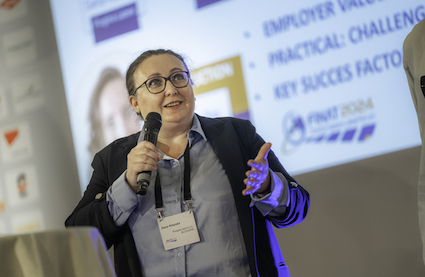
We recruit young staff from high school or printing college, offering them work experience and training and then try to keep the best ones in the company. The culture and brand of the company is critical. Luckily, we have a lot of people locally in Bratislava and even from other regions of Slovakia contacting us and asking to work with us. But we carefully choose the people we think will fi t our culture. This is really important. We try to explain why we are doing what we are doing, how we are doing it, and we try to understand the person before they enter the business. Sometimes schools visit our site and we explain the reality of working at a label printing operation. We are very open: we tell the truth about the long hours, hard work and short breaks. We fi nd that our young employees are often keen to learn new things and to experience working in different departments within the company. When employees are recruited from a bigger, more corporate company, it can be difficult because of the different cultures. They will behave differently from people who are used to working at a family-run business of 50 people – we have entirely different habits. We know who we compete with to recruit staff – Slovakia is a small market. But we have great experience and people often approach us because they want to work here.
Tom Baker, finance and development, Baker Labels
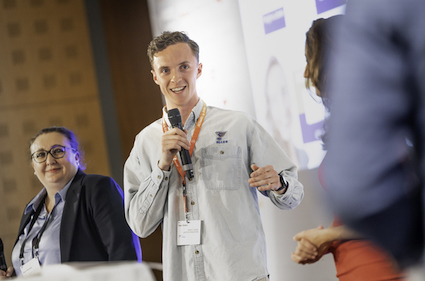
We push the cultural side of things very hard. We’ve been pushing wellbeing and training for a long time. We like to offer stuff outside of the day-to-day. You’re going to spend a lot of your time at work, so you might as well enjoy it. We’ve put in a gym and a bar. We offer free counseling sessions with a third party. We have mental health workplace champions. People want to understand their opportunities and what their path could look like. We’ve developed a training system so that we can give people plans. We can say: over the next three months this is what we want you to learn. These are the goals. It’s something outside their day-to-day and gives a bit more purpose. We’ll also set someone a task and let them crack on with it and see what comes back. People are good at learning and pushing themselves, and it builds the proper habits. I think we need to shift how we look at the industry, especially for our generation. In a digital environment, you just press print and it comes out. My dad was gobsmacked the fi rst day with a digital press. But we’ve grown up knowing that. So it’s more about pushing forward systems that support it. Some of our staff who have ended up doing really well came in thinking ‘this is a temporary job’. But they start to see there is a lot more to this than just print. It’s not just a label. There are opportunities to work with software systems, automation, AI. We’ve not had so many problems with people leaving. Sometimes it comes down to money and that’s it. But that’s not usually the case for the younger generation. I think because we can offer a nice working environment, people who do leave will sometimes come back, and we have staff who bring family members in because it’s a nice workplace.
AI takes center stage
“This industry is more than just print. It’s not just a label. There are opportunities to work with software systems, automation, AI”
Artificial Intelligence was undoubtedly the hottest topic at this year’s European Label Forum, hosted by Finat in Athens, Greece from May 22-24. Setting the scene was Katie King, an AI expert, published author and keynote speaker. She focused her keynote on the impact of artificial intelligence will have on various industries, and explored how it can radically revolutionize the label industry. She underscored how AI is becoming an integral part of business operations across the board – from fi nance to marketing, machine learning to recruitment. ‘This is the defining technology of our generation,’ King says, adding that AI tools are not replacing jobs, but enhancing them. ‘These tools are allies, and the ones that don’t adapt and use these tools will be the ones that will be left behind. I believe these tools are making us more strategic.’ King also explored the ethical considerations for implementing AI in businesses and emphasized the need to avoid biases, which often arise from flawed data. Looking ahead, King predicted that AI would become more embedded in everyday life, enhancing various business functions, and improving productivity. King will bring a similar message to Labelexpo Americas, where she will speak as part of a keynote address during a breakfast networking event on Sept 10.
By Chelsea McDougall
Stay up to date
Subscribe to the free Label News newsletter and receive the latest content every week. We'll never share your email address.


